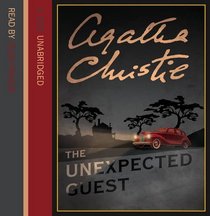Helpful Score: 2
A very quick read, totally unexpected ending, really good book
Helpful Score: 2
I've read several of Christie's plays, this one is an enjoyable read, but not the most hardest crime to solve. Nevertheless, I would recommend it to any mystery fan.
Helpful Score: 2
I really liked this book. It was the first one I read based on an Agatha Christie play. Osborne did a great job making it sound like one of Christie's books. The ending was unexpected (ha-ha!) and a book I've enjoyed reading again and again.
Helpful Score: 2
Adaptation by Charles Osborne of her play of the same title. Richard Warwick is dead. Who shot him in the head? His wife? Her lover? The distraught litigant? The gardner? His valet? The nurse? His mother? His loony half-brother? Suspicion shifts among them scene by scene. So does the motive for whacking him. See if you can outwit Auntie Agatha.
Charles Osborne adapts the Christie play into a novel. You will never know Dame Agatha herself did not write it.
From Publishers Weekly
As he did with Black Coffee (1998), Osborne has taken one of Christie's original play scripts and turned it into a (slight) novel. For those who can't see the play in production or who find a script dull or difficult reading, Osborne's adaptation may fill a need. But Osborne has added little flesh to the bones of the drama, which, with its single-room setting, absolutely retains the feel of a play merely masquerading as a novel rather than transformed into one. That's not all bad, as this novelization preserves the lightning-quick pace of the original. Christie's play had its premiere in 1958, yet remains undated by the passing years. When a stranger having car trouble at night on a lonely road enters a house through the French windows of its study, he finds an invalid who has been shot dead and a woman (his wife) standing nearby and holding a gun. Apparently on impulse, the stranger decides to help the woman hide her crime. Those two plus a small castAthe victim's mother; the victim's teenage half-brother; his housekeeper/secretary; and his male nurseAparade kaleidoscopically in and out of the study with two investigating police officers. Christie cleverly shifts suspicion and parcels out new facts and perspectives in marvelous fashion, proving ingeniously that the obvious isn't always obvious.
As he did with Black Coffee (1998), Osborne has taken one of Christie's original play scripts and turned it into a (slight) novel. For those who can't see the play in production or who find a script dull or difficult reading, Osborne's adaptation may fill a need. But Osborne has added little flesh to the bones of the drama, which, with its single-room setting, absolutely retains the feel of a play merely masquerading as a novel rather than transformed into one. That's not all bad, as this novelization preserves the lightning-quick pace of the original. Christie's play had its premiere in 1958, yet remains undated by the passing years. When a stranger having car trouble at night on a lonely road enters a house through the French windows of its study, he finds an invalid who has been shot dead and a woman (his wife) standing nearby and holding a gun. Apparently on impulse, the stranger decides to help the woman hide her crime. Those two plus a small castAthe victim's mother; the victim's teenage half-brother; his housekeeper/secretary; and his male nurseAparade kaleidoscopically in and out of the study with two investigating police officers. Christie cleverly shifts suspicion and parcels out new facts and perspectives in marvelous fashion, proving ingeniously that the obvious isn't always obvious.
A novelization of Christie's play.
Ingenious plot, vintage Christie mystery !
Very good adaptation of the play. Classic Christie
I was unimpressed. it has the typical Christie twist, but was somewhat flat and went on too long. (I number a few of her books as top favorites, so it's not that I am anti-Christie.)
Originally a Agatha Christie screenplay . Osborne puts it into book form. This is the first Agatha Christie book I have read.




